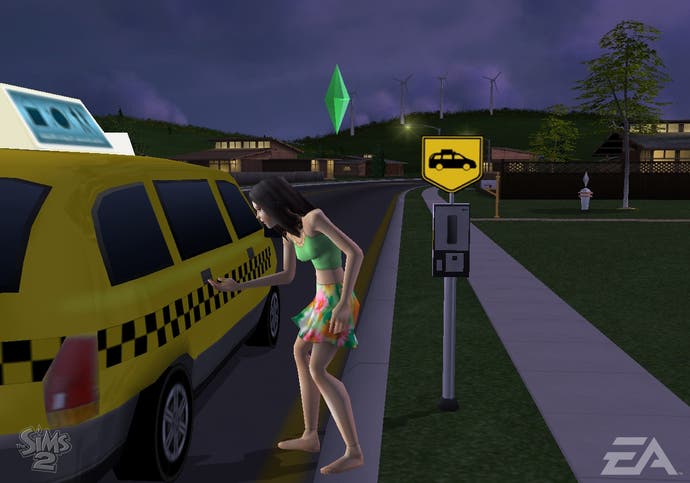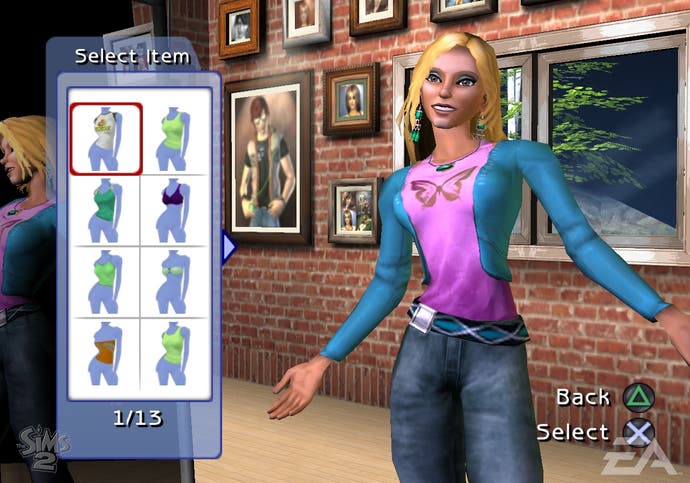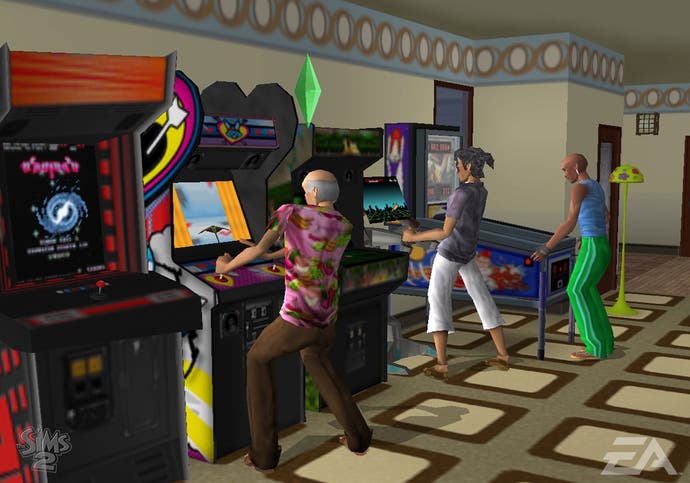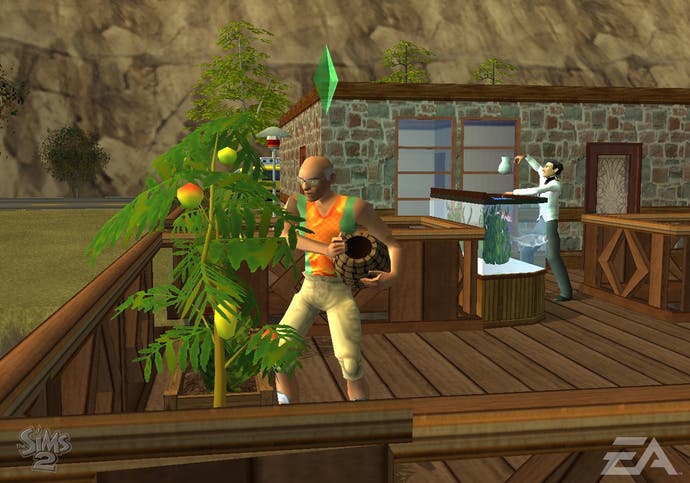The Sims 2
A life more ordinary (than the PC original).
The Sims 2 is the type of game that defies easy classification. Part god sim, part RPG, it's a digital dollhouse in which you attend to the needs and wants of your Sims, maintaining their happiness and health by encouraging them to interact with an environment you can incrementally improve. As so much of your time is spent ordering a Sim to perform chores to maintain their wellbeing - particularly cleaning, cooking, ablutions and bathroom breaks - the challenge is, broadly speaking, time management. If you plan your Sim's day-to-day activities carefully, topping up meters as required, you gain little windows of opportunity where you can experiment with new items, forge new relationships with other Sims, or work on enhancing skill levels.
At this point, there's something we should set straight: cast all thoughts of the PC incarnation of Sims 2 from your mind right now. This isn't a conversion per se, but rather a console-specific interpretation of a markedly more sophisticated original release. It's a "lite" version with the basic form and functions of its PC peer, but palpably less substance, sans the extra features (particularly the concept of raising families), mods and expansion packs.
Perhaps acknowledging that the abridged feature list renders The Sims 2 a less beguiling prospect as a freeform toyset, the console versions introduce Story Mode. In this, you can unlock (and immediately take up residence in) new houses, and switch control to specific Sims in order to fulfil their desires. You can still play at your own pace and ignore periodic prompts to fulfil task A, B, C or D, but the addition of specific goals introduces an element of structure. The alternative Freeplay mode is a more traditional, open-ended Sims sandbox that enables you to create a group of Sims, pick or build a dwelling for them to live in, and then play as you please. The difference between the two is that, while Story Mode dangles carrots from sticks for you to chase, Freeplay offers an entire field of them to pick (almost) as you please. The latter can feel aimless and flat as a consequence.

Progression in Sims 2 is measured by the fulfilment of 'wants': from mundane tasks such as changing clothes, to career success, sexual conquests and artistic endeavours. The provision of these is influenced by the character archetype you choose in the initial character creation phase. There are five different types (called 'aspirations') to pick. If you opt for the Romance aspiration and choose to play the role of a philandering Lothario, for example, you can reasonably expect the majority of your set tasks to involve interaction with (and, naturally, the seduction of) other Sims. A Sim with the Creative label, by contrast, is more likely to be given projects involving painting or cooking. Completing 'wants' enables you to unlock additional items to improve your Sim's environment and, in Story Mode, eventually gain access to new locales. Equally, though, you need to avoid 'fears': a trio of periodically updated events (such as a priapic womaniser being caught in the act by a girlfriend) that will make your Sim less happy.
From first play, experimenting with your environment is a rudimentary pleasure, but a pleasure nonetheless. Learning the different ways that you can use objects to enhance your Sim's mood, increase skill levels or fulfil 'wants' is enjoyable in a low-key kind of way: you press X, enjoy a stock animation, then note how it influences your Sim's status. The problem, though, is that these animated sequences are naturally of fleeting value as a reward mechanism. With your participation limited to initiating a process - say, your Sim using a surfing machine, or lifting weights - repeat use of objects is only really necessary (or, indeed, desirable) if it raises a skill or need gauge when required.

The core mechanic of attending to your Sims' everyday needs (toilet stops, cooking, sleep, et al) and the necessity of sending them to work (in order to gain money to buy objects) means that new items are drip-fed into play on a slow, incremental basis. This is, in principle, fine. However, the fundamental flaw with Sims 2 on PlayStation 2 is that, both in technical terms and by design, the central nurturing element is time-consuming, repetitive and, ultimately, not a source of meaningful gratification. The cycle of performing staple tasks over and over was an issue with the PC original. Here, it's exacerbated by constant load pauses; idle time spent listening to the urgent whisper of the PS2 spooling all-too-familiar animations from the DVD. Bewilderingly, EA has chosen to add to these chores by introducing a new cooking feature to this console version. Being a three-step system - choose ingredients from fridge, prepare meal, eat - this leads to yet more disc-based delays. How, exactly, was that judged to be a good idea?
Sometimes, everything clicks into place, and the balance of Sims 2 feels right. On virtual days when you've topped up various gauges by feeding, freshening up and using specific devices, it's great to find that you have sufficient time to buy, position and try out a new toy before, say, it's time to go to bed, or head off to work. On other days, you can take a glance at onscreen gauges, and just know that you're going to be a slave to mundane busywork. As your Sims advance in their careers, you can buy objects that reduce the time and effort involved in their general maintenance. By that point, though, you've seen a lot of what Sims 2 truly has to offer; you're clapping your flippers together at a reduced rate, but there's a commensurately diminished return of fish.

It's perhaps unfair to draw comparisons between this version and the PC original, but the artificial intelligence appears functional at best. Other Sims rarely (if, frankly, ever) do anything unusual or surprising. Sure, they wander around, interact with each other, eat food, use the bathroom... but there are few traits beyond elementary aesthetics that give Sims any hint of individual character. They're mobile furniture, points of interactivity that can walk away. Conversations with other Sims are also disappointingly simple, governed by a rudimentary pick-'n'-mix list of possible subjects or activities that change based on the nature of your relationship. Select the 'right' gambit, and a relationship meter begins or continues its climb toward an eventual peak of 100. Choose the 'wrong' option, and a (sometimes quite substantial) sum is subtracted from your score.
With little apparent rhyme or reason for either reaction on many occasions, it all feels so arbitrary. There's also the fact that friendships in Sims 2 decline over time, which means you have yet another meter to feed. Everything in Sims 2 is about gauges: little bars going up, little bars going down. As you release your death-grip on the (frankly indispensable) time-skip button to move from one animated duty to another, you begin to suspect that this is less game, more checklist. Sleep? Check. Toilet? Check. Food? Check. Work? Check. Maintain harmonious relationship with Felicity? Check and, moreover, mate. Rinse. Repeat.

According to research recently published in German science magazine Geo Wissen, the average individual - with a hypothetical lifespan of 78 years - spends almost 25 years sleeping, seven years at work, five years eating and drinking, six months in the bathroom, and a mere sixteen hours having orgasms. This piece of almanac-style trivia is, in many ways, an apposite summary of The Sims 2 on PlayStation 2. The PC original entertained despite the oft-repetitive nature of its core gameplay; this PS2 release, lacking comparable (let alone equivalent) style and content, is a pale shadow of it. It's also packed with trivial flaws that, collectively, sap your will to continue - such as a Sim needing to carefully place a plate of food on the ground before he or she can turn a TV on, or important messages being lost when you use the time-skip button.
Choose to ignore these (and other) oversights, persevere with the drudgery of the maintenance aspect (the bit where, in a more conventional RPG/god game, you'd actually get to do stuff, like solve puzzles or kill things), and there's a lengthy itinerary of tasks to discover and perform - something that still appeals to my completist urges, despite everything else I've said here. If only EA had deemed it appropriate to nurture this malnourished, sickly son of a Tamagotchi a little longer before release...


